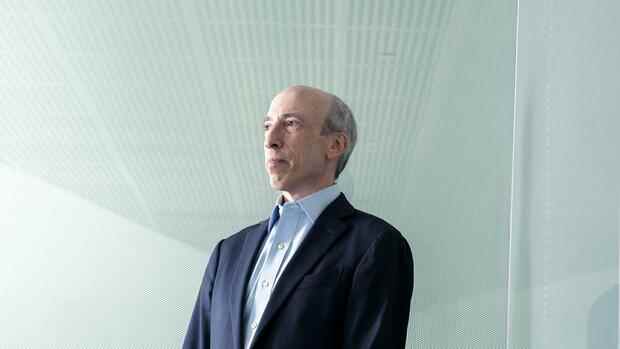The head of the authority sends clear signals to the operators of digital currencies.
(Photo: Bloomberg)
Frankfurt Gary Gensler’s to-do list is long and riddled with complicated cases. At the beginning of his tenure last spring, the turbulence surrounding the so-called Reddit traders, which caused unprecedented price capers in stocks such as Gamestop, AMC and Blackberry, dominated. In addition, there are a whole series of scandals in the crypto world and greenwashing allegations, for which the head of the US Securities and Exchange Commission (SEC) set up a task force early on.
His critics think he’s overextending himself. After all, even Wall Street’s top watchman has limited resources, and while his five-year tenure is longer than President Joe Biden’s, it may still be too short to make a real difference in political Washington.
Gensler, however, does not let this stop him. Last week he gave a first glimpse of his plan to strengthen small investors – with potentially far-reaching consequences for the well-established structures of the trillion dollar US stock market.
Brokers like Robinhood and TD Ameritrade are currently being paid to route their clients’ orders to so-called marketmakers, a kind of stock wholesalers. This includes companies like Citadel and Virtu Financial, which can then clear the orders directly without passing them on to an exchange like the New York Stock Exchange. This process is called “payment for order flow”.
Top jobs of the day
Find the best jobs now and
be notified by email.
The neo-broker Robinhood, which fueled the boom in Reddit traders, made 71 percent of its sales last year by forwarding customer orders to wholesalers. In return, trades at Robinhood are free of charge, just like other major US brokers.
More money for more control
Gensler now wants to have it checked whether small investors would not get better prices if their orders were forwarded directly to the large stock exchanges. He left details open last week, but he is signaling to Wall Street that he is not intimidated by big projects.
The 64-year-old also wants a bigger budget for his long to-do list. This is necessary in order to investigate the many cases of fraud in the crypto world, he demanded back in August last year. “These cases are complex. We could easily hire two to three times as many people and still not have enough,” admitted Gensler, who ran the CFTC under Barack Obama’s administration and previously had a career at Goldman Sachs.
>> Read also: Securities and Exchange Commission chief unveils reform plan for stock exchange trading
Gensler is a proven cryptocurrency expert. Prior to his appointment to head the SEC, he was a professor at MIT, teaching courses on bitcoin and the underlying blockchain technology.
That’s not to say Gensler is also a fan of digital currencies. On the contrary. The SEC chief announced a major crypto regulation offensive in August. It should be about the role of currencies with stable values, so-called stablecoins, as well as stock exchanges and crypto platforms that enable the lending and lending of digital currencies.
Gensler believes the platforms will offer a range of tokens for trading that qualify as securities. “If that’s the case, then they fall under our jurisdiction and they need to register with the SEC,” he clarified.
Also targeting the banks
He left it open which providers he had in mind. He urged stakeholders to “get in touch and work with us.” However, this is considered unlikely in the industry. That won’t deter Gensler. The SEC boss has perseverance – both professionally and privately. The widowed father of three daughters has run nine marathons and one ultra-marathon, and scaled both Kilimanjaro and Mount Rainier.
The Terra-Luna project, which collapsed within a few hours and caused a total loss for many small investors, recently showed how important more regulation is in the area of stablecoins.
It was not until Saturday that Gensler’s authority made headlines again: According to media reports, the SEC is investigating greenwashing allegations at Goldman Sachs. The SEC is also involved in the large-scale investigations at the fund house DWS, alongside the German financial regulator Bafin and the US Department of Justice. Gensler is once again sending warning signals to the ESG industry, which focuses on sustainable investments.
More: After the scandal at DWS: Ex-Blackrock manager calls for the ESG industry to be split up.
